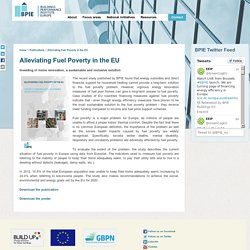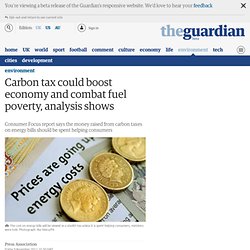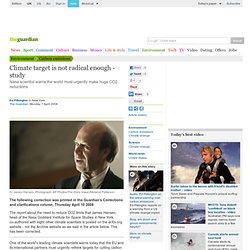

BPIE Buildings EU sur Twitter : "Financing #fuelpoverty measures in #Greece & #UK. Full poster #HeatingEU. Buildings Performance Institute Europe. Home > Publications > Alleviating Fuel Poverty in the EU The recent study published by BPIE found that energy subsidies and direct financial support for household heating cannot provide a long-term solution to the fuel poverty problem.

However, vigorous energy renovation measures of fuel poor homes can give a long-term answer to fuel poverty. Case studies of EU countries financing measures against fuel poverty indicate that - even though energy efficiency measures have proven to be the most sustainable solution to the fuel poverty problem - they receive lower funding compared to income and fuel price support schemes. Fuel poverty is a major problem for Europe, as millions of people are unable to afford a proper indoor thermal comfort.
Oil and trains make for a volatile combination in North America. While we have been worrying about what happens to the climate when we burn carbon, it seems we should have been noticing that the impact of moving it from its source to its markets were increasing.

San Francisco and 10 other cities move toward dumping stocks in fossil-fuel companies. Oil companies might be awfully profitable right now, but political leaders in San Francisco and 10 other U.S. cities want to dump their investments in them anyway.

San Francisco’s Board of Supervisors voted this week to urge the city’s investment fund managers to sell off more than $583 million worth of shares in Chevron, ExxonMobil, and some 200 other fossil-fuel companies. This makes San Francisco the biggest city to join the divestment campaign being pushed by 350.org, which began with a focus on colleges and universities. Seattle was the first city to join the campaign; its mayor got on board late last year. Divestment might still be months or years off, if it happens at all, but civic leaders calling for action is a critical first step. Richmond is an interesting example: It’s home to a nearly 3,000-acre Chevron oil refinery, so its residents know firsthand about the evils of the oil industry. Keep it coming, cities. Carbon tax could boost economy and combat fuel poverty, analysis shows. Money raised from carbon taxes on energy bills should be used to lift millions of households out of fuel poverty and boost the economy, it has been suggested.

The Treasury will receive billions of pounds a year from 2013 as energy companies are made to pay for carbon emissions, and the cost on energy bills will be viewed as a stealth tax unless it is spent helping consumers, ministers were told. Analysis for Consumer Focus estimates £63bn will be raised in revenues between 2013 and 2027 by making energy firms pay for the carbon they emit, rising from £2.7bn next year to £6.8bn a year in 15 years' time. The report estimates that households will be paying £21 a year next year, with the cost of the green policies rising to £39 by 2020. But rising energy bills, mostly driven by increasing gas prices, will see the number of households in fuel poverty - spending more than 10% of their income on heating their homes - grow from 6m to more than 9m by 2016.
Does More E-mail = Less Carbon? · Environmental Leader · Green B. Research currently underway at Sun Microsystems is trying to measure the carbon footprint of individual e-mails, BusinessGreen reports. The aim of the exercise is to try and prove, quantifiably, that e-mail has an environmental advantage over other methods of communication. The research also hopes to enable firms to benchmark the carbon footprint of their own e-mail systems against best practices. The resulting metric should allow firms to identify the policies and systems they could implement to ensure the carbon footprint from their emails are as low as possible, said Richard Barrington, head of sustainability and public policy at Sun in the UK. “It is not an easy task but we are looking at the mail servers, the different software applications used, the network devices and trying to extrapolate the energy used back to the email itself,” Barrington said.
Sun recently was named one of the “100 Best Corporate Citizens” and also made Infoworld’s Green 15. Climate target is not radical enough - study. Dr James Hansen.

Photograph: AP Photos/The Daily Iowan/Melanie Patterson The following correction was printed in the Guardian's Corrections and clarifications column, Thursday April 10 2008 The report about the need to reduce CO2 limits that James Hansen, head of the Nasa Goddard Institute for Space Studies in New York, co-authored with eight other climate scientists is posted on the arXiv.org website - not the Archive website as we said in the article below. This has been corrected. One of the world's leading climate scientists warns today that the EU and its international partners must urgently rethink targets for cutting carbon dioxide in the atmosphere because of fears they have grossly underestimated the scale of the problem.
In a startling reappraisal of the threat, James Hansen, head of the Nasa Goddard Institute for Space Studies in New York, calls for a sharp reduction in C02 limits. At levels as high as 550ppm, the world would warm by 6C, the paper finds. The Green Issue - Climate Change - Environment - Energy Efficien.